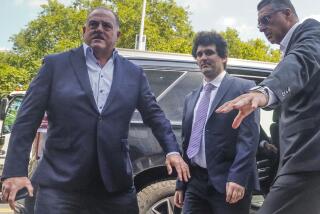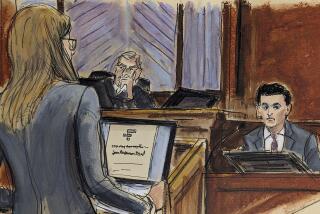Keating Lawyers Protest Fraud Charges : Thrifts: The pretrial statements provide hints of what the defense strategy may be.
- Share via
Lawyers for former thrift owner Charles H. Keating Jr. and three co-defendants said Monday that fraud charges against their clients should be dismissed because the allegations are vague and were brought under an “unconstitutional” state statute.
The statements came in a pretrial hearing before Los Angeles County Superior Court Judge Lance A. Ito. It provided a glimpse of the early defense strategy in the first criminal trial arising from the April, 1989, collapse of Lincoln Savings & Loan in Irvine.
Ito set an Oct. 26 hearing for arguments on the defense challenges. He also set Dec. 5 for the trial, a date the judge said was likely “overly optimistic.”
Keating is the former chairman of American Continental Corp. in Phoenix, which owned Lincoln. He and the co-defendants are charged in a 42-count indictment with securities fraud and other violations. The defendants, who face possible sentences of 10 years in prison if convicted, have pleaded not guilty.
The indictment accuses Keating of defrauding small investors who bought $200 million in American Continental bonds through Lincoln’s 29 Southern California branches. Bondholders claim that they were led to believe the bonds were safe and federally insured.
The bonds became worthless after American filed for bankruptcy protection in April, 1989. Regulators seized Lincoln the next day.
Keating, 66, has been held in the Los Angeles County Jail on $5 million bail since Sept. 18, though a U.S. District Court judge is reviewing the high bail. The other defendants--Judy J. Wischer, 42, former president of American Continental; Robin S. Symes, 38, and Ray C. Fidel, 32, both former Lincoln presidents--have been released on reduced bail.
Keating appeared pale and thinner but was smiling as he walked into the courtroom and greeted his family. After the hearing, Ito closed the courtroom for 10 minutes so that Keating could meet with his wife, six children and other family members.
Held in check by his lawyers since entering jail, the usually talkative Keating finally spoke briefly to reporters as he arrived at the courthouse, saying, “It’s dangerous to be right when the government is wrong.”
In court Monday, defense lawyers said they will argue that the case be dismissed because the indictment fails to state specifically what the defendants did that was illegal. The indictment alleges that the defendants violated two laws with respect to 20 individuals, that the defendants lied to the state Department of Corporations, which approved the bond sales, and that they failed to clear bond sale advertising with the state agency.
But the indictment doesn’t state specifically what the defendants told state officials or what was false or misleading in the bond sales. Thus, the defense lawyers contend, the indictment fails to give the defendants sufficient notice of what they did wrong.
Defense lawyers also contend that the state securities law on which the indictment is based is unconstitutional because it imposes criminal penalties based on what is called “vicarious liability,” which permits defendants to be found guilty for the actions of employees even though defendants didn’t know what the employees had done.
More to Read
Inside the business of entertainment
The Wide Shot brings you news, analysis and insights on everything from streaming wars to production — and what it all means for the future.
You may occasionally receive promotional content from the Los Angeles Times.










